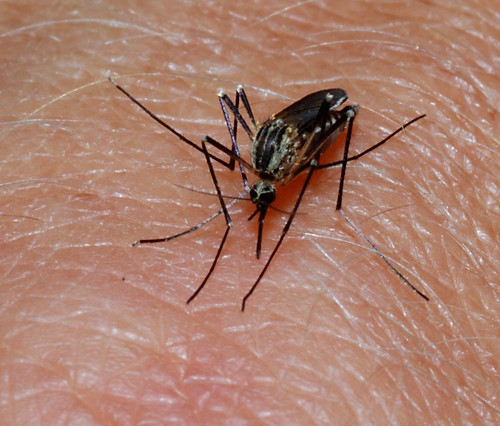There have been loads of references recently to the recent mosquito DEET story. Mosquitoes adapt to DEET rapidly and cease to be repelled by it. It has very wrongly been described as "evolution". It has nothing to do with evolution.... it is simple biochemistry/pharmacology.
Background
OK, DEET is a really effective mosquito repellent I first heard of it travelling to Florida. Some people seem to be inherently more pre-disposed to being bitten by mosquitoes than others... I am one of those people that seem to be extremely tasty! I guess it's because I smell nice? Anyway the Park Rangers showed me how to cover-up from the insects and slap on insect repellent This was remarkably effective. Having come from the UK, our products at the time (1970s) were woeful... but this American DEET containing product was really great. Don't confuse it with DDT which is a powerful insecticide... that builds up in insect eating animals etc. etc.

The Phenomenon
DEET is smelly. Insects don't like the smell. A phenomenon with smells is that you rapidly get used to them and cease to detect them. Take body odour (BO). The magic of BO is that you cannot smell it, and everyone else can? Noticed? It is because you have gotten used to the smell and can no longer detect it. Noticed someone walk in the room and say it smells like burning? The only way to check is to leave the room walk about and then walk back in and see if you can NOW smell it?
This is the phenomenon is known as desensitisation. Or technically "receptor desensitisation". It is also at the heart of many medical conditions in particular, physical drug addiction (psychological dependence is a bit different). So am I saying the DEET mosquito phenomenon is related to drug addiction? I certainly am. The science is the same.
The Science Bit
Here goes, hold on to your hats. Most drugs work by combining with a type of protein in the body called a receptor. Each drug has its own receptor. "Drug" in this context is a substance which causes a biological effect... it does not equate to "illegal substance" or "narcotic" or anything. Opium is a drug, but so is Sudafed (pseudoephedrine). Once the receptor protein has combined with the drug, it causes an effect or a "response". The response depends on the type of drug and receptor we are talking about. Some, like opium combining with opium receptors reduce pain and cause euphoria. Others cause blood vessels constrict or dilate... or make you sleep! Smells work in exactly the same way as drugs. (So do tastes.) They are chemical gases or vapours which dissolve in the snot of your nose and then combine with a protein receptor and cause a response. The response in this case though is simply to alert the brain to the fact that this particular smell is present.
So smells are just like drugs?
Well no, smells aren't like drugs, but the point is the the biological mechanisms by which they work are the same as the way drugs work!
So smells are just like drugs?
With most drugs, there is a mechanism of receptor desensitisation where the same dose of drug causes progressively small effects each time you use it. The exact mechanism by which this happens is not entirely understood, but its investigated a lot of course!
So repeated exposure to a drug or a smell leads to that substance being detected less and less. With opium, to get the same kick... you have to take more and more. With smells this explains why you can't smell your own perfume (all day) or why you can rarely detect your own body odour!!! Mmm yum! What happens long term?
Well if you stop taking the drug, or you stop being smelly... you start to return to normal and become sensitive to the substance again! How long does it take? Depends on the substance. Can be minutes, can be days or weeks. For a human smell, its probably minutes. For it to, in ANY way, be like evolution it would have to pass on to the next generation!! The BBC should not just quote any unguarded comment that we scientists make, they should check it makes sense first.
So repeated exposure to a drug or a smell leads to that substance being detected less and less. With opium, to get the same kick... you have to take more and more. With smells this explains why you can't smell your own perfume (all day) or why you can rarely detect your own body odour!!! Mmm yum! What happens long term?
Well if you stop taking the drug, or you stop being smelly... you start to return to normal and become sensitive to the substance again! How long does it take? Depends on the substance. Can be minutes, can be days or weeks. For a human smell, its probably minutes. For it to, in ANY way, be like evolution it would have to pass on to the next generation!! The BBC should not just quote any unguarded comment that we scientists make, they should check it makes sense first.
The bottom line
So this seems to be all that is happening with DEET. The receptors desensitise. The "adaptation
" of mosquitoes to DEET is an interesting discovery, but not surprising in the light of our understanding of how smells work..... probably temporary and NOTHING to do with evolution!!!
Some translations:
opium is really a combination of natural opioids; mainly morphine.
The technical word for the process of smelling is "olfaction", the substance you smell is called an olfactant and the receptor it binds to is called olfactory receptor.

